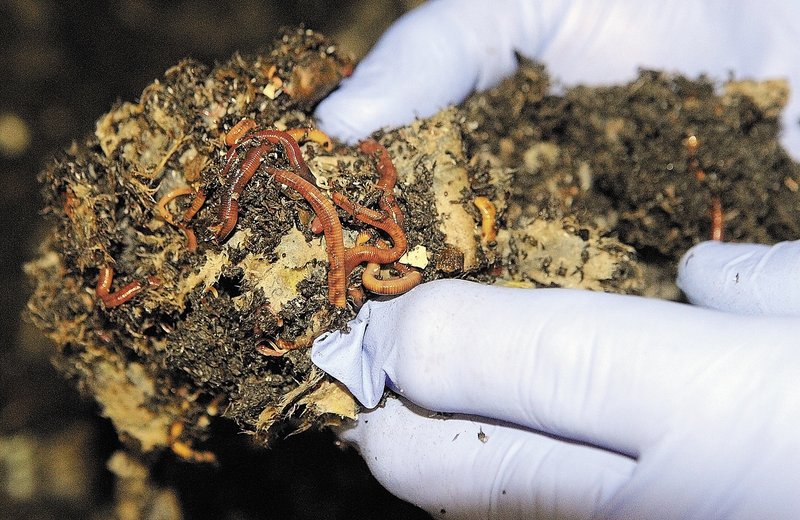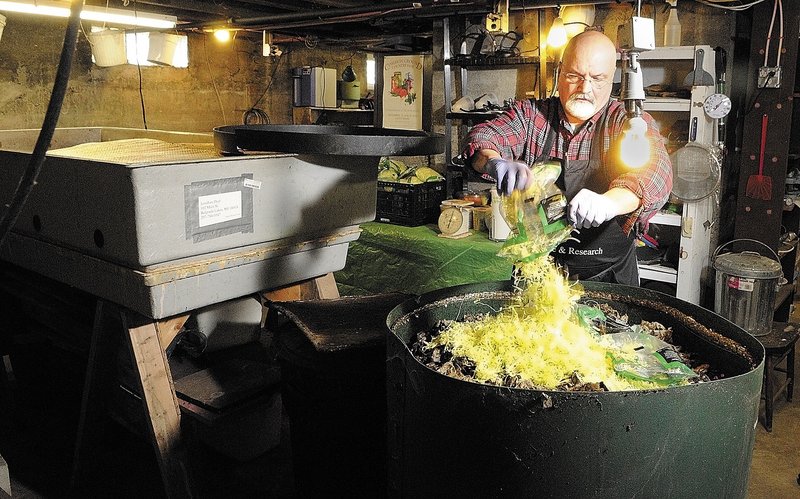BELGRADE — Jonathan Dyer enjoys introducing visitors to the slithering creatures in his basement.
The lower half of his home on Main Street in Belgrade Lakes is brightly lit with an array of bins, wooden boxes and tubs filled with, well, poop.
It’s not just any poop — it’s from the red wiggler.
The waste of these 4-inch worms results in a humus-like material rich in soil nutrients that orchards, nurseries and gardeners love. Dyer, the owner of Black Gold Vermiculture & Research, said a pound of wigglers — about 1,000 worms — can digest a half-pound of organic table scraps a day.
Right now he’s producing about 200 pounds of worm compost a week. His goal is half a ton per week.
Dyer, 62, said the worm poop, called castings, is five times richer in available nitrogen, seven times richer in phosphates and 11 times richer in potassium than the upper six inches of soil.
Dyer feeds his worms expired food from Auburn’s Good Shepherd Food Bank. He said the food is free to local farmers for their livestock and, in return, Dyer donates 10 percent of his profits to the food bank. Neighbors also contribute their scraps, including coffee grounds and tea bags.
A long list of foods enjoyed by his worms hangs on the wall of his worm room. It includes potatoes, apples and peels, baked beans, banana peels, turnip leaves, grass clippings, tea leaves, coffee grounds and the filter, newspaper, orange peel and biscuits.
“You can’t feed them any dairy products. No meat. Nothing citric,” Dyer said as he pulled back an insulated cover of a 32-square-foot bin filled with 100,000 worms. “You make sure they have a lot of moisture and air and the right pH and they’re happy.”
WORM FARMING SCIENCE
Dyer, a chemist who owns an environmental laboratory in Auburn, said there’s a science to worm farming, also known as vermiculture. It’s an oxygen-using process performed by worms and microorganisms, he said.
Worms eat microorganisms and decomposing products — sugars, proteins and simple carbohydrates — released by the microorganisms. The organic material travels through the worm’s digestive system and the end product is vermicompost otherwise known as worm castings, worm humus or worm manure.
He said red wigglers are a little bit smaller than the typical earth worm used for bait. They live within 12 inches of soil surface instead of burrowing down like European nightcrawlers.
Dyer started up the business six years ago with 5,000 worms. It was his wife’s idea.
“She saw a show on worm farming with Martha Stewart and said I should take it up as a hobby,” he said.
Sylvia Dyer said she and her husband have been together almost 40 years, and during that time he has had many interests. “Nowadays, I pretty much know where he is when he’s working on his hobby — he’s in our basement,” she said.
Dyer said he dries out the manure, which has an earthy smell, to make it easier to handle then screens it in a tumbler to get a finer product. He said the product is approved by the Maine Organic Farmers Association for use by organic growers.
HIS ‘LITTLE GUYS’
Last Tuesday was feeding day.
Dyer opened packages of expired shredded lettuce that had started to rot and layered them on top of the worm bed contained in a huge blue bin. He crushed egg shells and poured coffee grounds on top, then added ripped-up newspapers that he first soaked in water.
“I don’t have to cut up the shredded lettuce, but I have to cut up other foods,” he said. “Some friends drop off apples. I have to cut those up. Worms don’t have teeth. They have gizzards, so I also have to add a little sand to help them digest the food.”
The black gold, as he calls it, falls through a screen at the bottom of the bin that he shovels up and places in containers to dry.
If the environment becomes too acidic, the worms will crawl out. Egg shells help even out the pH levels, he said.
Dyer gives school tours and is invited into classrooms to talk to students about worm farming. Last year, he helped conservation groups in town when his worms devoured 1,500 pounds of the invasive aquatic plant milfoil that volunteers hand-pulled from Great Pond. The worms’ effort produced 300 pounds of compost.
He also is in contact with the University of Maine to open up his operation to interns.
Dyer said he plans to retire next year and devote all his time to his worm farm. Until then, his weekends and every evening after he arrives home from work are spent down in the basement with the “little guys.”
“The Greek philosopher Aristotle said, ‘Worms are the intestines of the earth,’ ” he said. “There’s a real zen to this whole thing. The zen of the spineless creatures. My wife calls me and I just shut my door. I’m down here with my worms and they just love me.”
Kennebec Journal Staff Writer Mechele Cooper can be contacted at 621-5663 or at: mcooper@centralmaine.com
Send questions/comments to the editors.




Success. Please wait for the page to reload. If the page does not reload within 5 seconds, please refresh the page.
Enter your email and password to access comments.
Hi, to comment on stories you must . This profile is in addition to your subscription and website login.
Already have a commenting profile? .
Invalid username/password.
Please check your email to confirm and complete your registration.
Only subscribers are eligible to post comments. Please subscribe or login first for digital access. Here’s why.
Use the form below to reset your password. When you've submitted your account email, we will send an email with a reset code.